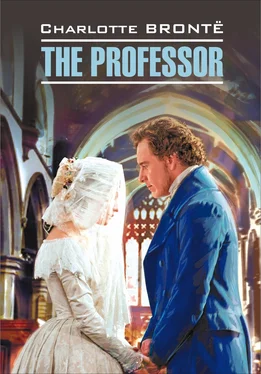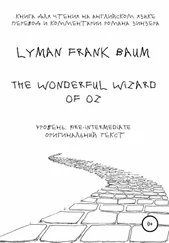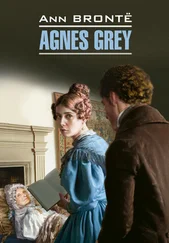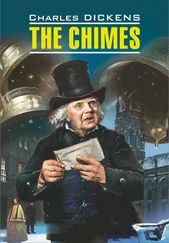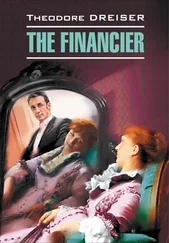Шарлотта Бронте - The Professor / Учитель. Книга для чтения на английском языке
Здесь есть возможность читать онлайн «Шарлотта Бронте - The Professor / Учитель. Книга для чтения на английском языке» — ознакомительный отрывок электронной книги совершенно бесплатно, а после прочтения отрывка купить полную версию. В некоторых случаях можно слушать аудио, скачать через торрент в формате fb2 и присутствует краткое содержание. ISBN: , Жанр: foreign_language, literature_19, foreign_prose, на английском языке. Описание произведения, (предисловие) а так же отзывы посетителей доступны на портале библиотеки ЛибКат.
- Название:The Professor / Учитель. Книга для чтения на английском языке
- Автор:
- Жанр:
- Год:неизвестен
- ISBN:978-5-9925-0777-5
- Рейтинг книги:5 / 5. Голосов: 1
-
Избранное:Добавить в избранное
- Отзывы:
-
Ваша оценка:
- 100
- 1
- 2
- 3
- 4
- 5
The Professor / Учитель. Книга для чтения на английском языке: краткое содержание, описание и аннотация
Предлагаем к чтению аннотацию, описание, краткое содержание или предисловие (зависит от того, что написал сам автор книги «The Professor / Учитель. Книга для чтения на английском языке»). Если вы не нашли необходимую информацию о книге — напишите в комментариях, мы постараемся отыскать её.
В книгу вошел полный неадаптированный текст романа с комментариями и словарем.
The Professor / Учитель. Книга для чтения на английском языке — читать онлайн ознакомительный отрывок
Ниже представлен текст книги, разбитый по страницам. Система сохранения места последней прочитанной страницы, позволяет с удобством читать онлайн бесплатно книгу «The Professor / Учитель. Книга для чтения на английском языке», без необходимости каждый раз заново искать на чём Вы остановились. Поставьте закладку, и сможете в любой момент перейти на страницу, на которой закончили чтение.
Интервал:
Закладка:
“Would you object to taking the boys as they are, and testing their profficiency in English?”
The proposal was unexpected. I had thought I should have been allowed at least 3 days to prepare; but it is a bad omen to commence any career by hesitation [108] it is a bad omen to commence any career by hesitation – ( разг. ) дурная примета – начинать любое дело с сомнений и колебаний
, so I just stepped to the professor’s desk near which we stood, and faced the circle of my pupils. I took a moment to collect my thoughts, and likewise to frame in French the sentence by which I proposed to open business. I made it as short as possible:
“ Messieurs, prenez vos livres de lecture. [109] Messieurs, prenez vos livres de lecture. – ( фр. ) Господа, приготовьте книги для чтения.
”
“ Anglais ou Français, monsieur? [110] Anglais ou Français, monsieur? – ( фр. ) На английском или на французском, мсье?
” demanded a thickset, moon-faced young Flamand in a blouse. The answer was fortunately easy:
“ Anglais. [111] Anglais. – ( фр. ) На английском.
”
I determined to give myself as little trouble as possible in this lesson; it would not do yet to trust my unpractised tongue with the delivery of explanations; my accent and idiom would be too open to the criticisms of the young gentlemen before me, relative to whom I felt already it would be necessary at once to take up an advantageous position, and I proceeded to employ means accordingly.
“ Commencez! [112] Commencez! – ( фр. ) Начинайте!
” cried I, when they had all produced their books. The moon-faced youth (by name Jules Vanderkelkov, as I afterwards learnt) took the first sentence. The “ livre de lecture ” was the “Vicar of Wakefield,” much used in foreign schools because it is supposed to contain prime samples of conversational English; it might, however, have been a Runic scroll for any resemblance the words, as enunciated by Jules, bore to the language in ordinary use amongst the natives of Great Britain. My God! how he did snufle, snort, and wheeze! All he said was said in his throat and nose, for it is thus the Flamands speak, but I heard him to the end of his paragraph without proffering a word of correction, whereat he looked vastly self-complacent, convinced, no doubt, that he had acquitted himself like a real born and bred “ Anglais .” In the same unmoved silence I listened to a dozen in rotation, and when the twelfth had concluded with splutter, hiss, and mumble, I solemnly laid down the book.
“ Arrêtez! [113] Arrêtez! – ( фр. ) Достаточно.
” said I. There was a pause, during which I regarded them all with a steady and somewhat stern gaze; a dog, if stared at hard enough and long enough, will show symptoms of embarrassment, and so at length did my bench of Belgians. Perceiving that some of the faces before me were beginning to look sullen, and others ashamed, I slowly joined my hands, and ejaculated in a deep “ voix de poitrine [114] voix de poitrine – ( фр. ) утробным голосом
”:
“ Comme c’est aff reux! [115] Comme c’est aff reux! – ( фр. ) Какой ужас!
”
They looked at each other, pouted, coloured, swung their heels; they were not pleased, I saw, but they were impressed, and in the way I wished them to be. Having thus taken them down a peg in their self-conceit [116] Having thus taken them down a peg in their self-conceit – ( разг. ) Осадив таким образом этих самонадеянных юнцов
, the next step was to raise myself in their estimation; not a very easy thing, considering that I hardly dared to speak for fear of betraying my own deficiencies.
“Écoutez, messieurs! [117] “ Écoutez, messieurs! – ( фр. ) Слушайте, господа!
” said I, and I endeavoured to throw into my accents the compassionate tone of a superior being, who, touched by the extremity of the helplessness, which at first only excited his scorn, deigns at length to bestow aid. I then began at the very beginning of the “Vicar of Wakefield,” and read, in a slow, distinct voice, some twenty pages, they all the while sitting mute and listening with fixed attention; by the time I had done nearly an hour had elapsed. I then rose and said:
“ C’est assez pour aujourd’hui, messieurs; demain nous recommencerons, et j’espere que tout ira bien. [118] C’est assez pour aujourd’hui, messieurs; demain, nous recommencerons, et j’espere que tout ira bien. – ( фр. ) На сегодня все, господа; завтра мы возобновим чтение и, надеюсь, все будет хорошо.
”
With this oracular sentence I bowed, and in company with M. Pelet quitted the school-room.
“ C’est bien! c’est tres bien! ” said my principal as we entered his parlour. “ Je vois que monsieur a de l’adresse; cela me plait, car, dans l’instruction, l’adresse fait tout autant que le savoir. [119] C’est bien! c’est tres bien! Je vois que monsieur a de l’adresse; cela me plait, car, dans l’instruction, l’adresse fait tout autant que le savoir. – ( фр. ) Хорошо! Очень хорошо!.. Я вижу, у мсье есть талант; мне это нравится, ибо в учительском деле талант столь же ценим, как и ученость.
”
From the parlour M. Pelet conducted me to my apartment, my “ chambre [120] chambre – ( фр. ) комната
,” as Monsieur said with a certain air of complacency. It was a very small room, with an excessively small bed, but M. Pelet gave me to understand that I was to occupy it quite alone, which was of course a great comfort. Yet, though so limited in dimensions, it had two windows. Light not being taxed in Belgium, the people never grudge its admission into their houses; just here, however, this observation is not very à propos [121] à propos – ( фр. ) кстати
, for one of these windows was boarded up; the open windows looked into the boys’ playground. I glanced at the other, as wondering what aspect it would present if disencumbered of the boards. M. Pelet read, I suppose, the expression of my eye; he explained:
“ La fenêtre fermée donne sur un jardin appartenant à un pensionnat de demoiselles,” said he , “et les convenances exigent – enfin, vous comprenez – n’est-ce pas, monsieur? [122] La fenêtre fermée donne sur un jardin appartenant à un pensionnat de demoiselles, … et les convenances exigent – enfin, vous comprenez – n’est-ce pas, monsieur? – ( фр. ) Забитое окно выходит в сад женского пансиона и приличия требуют… словом, вы понимаете, не правда ли, мсье?
”
“ Oui, oui [123] Oui, oui – ( фр. ) Да, да
,” was my reply, and I looked of course quite satisfied; but when M. Pelet had retired and closed the door after him, the first thing I did was to scrutinize closely the nailed boards, hoping to find some chink or crevice which I might enlarge, and so get a peep at the consecrated ground. My researches were vain, for the boards were well joined and strongly nailed. It is astonishing how disappointed I felt. I thought it would have been so pleasant to have looked out upon a garden planted with flowers and trees, so amusing to have watched the demoiselles at their play; to have studied female character in a variety of phases, myself the while sheltered from view by a modest muslin curtain, whereas, owing doubtless to the absurd scruples of some old duenna of a directress, I had now only the option of looking at a bare gravelled court, with an enormous “ pas de géant [124] pas de géant – ( фр. ) огромная голая площадка
” in the middle, and the monotonous walls and windows of a boys’ school-house round. Not only then, but many a time after, especially in moments of weariness and low spirits, did I look with dissatisfied eyes on that most tantalizing board, longing to tear it away and get a glimpse of the green region which I imagined to lie beyond. I knew a tree grew close up to the window, for though there were as yet no leaves to rustle, I often heard at night the tapping of branches against the panes. In the daytime, when I listened attentively, I could hear, even through the boards, the voices of the demoiselles in their hours of recreation, and, to speak the honest truth, my sentimental reflections were occasionally a trifle disarranged by the not quite silvery, in fact the too often brazen sounds, which, rising from the unseen paradise below, penetrated clamorously into my solitude. Not to mince matters [125] Not to mince matters – ( разг. ) Честно признаться
, it really seemed to me a doubtful case whether the lungs of Mdlle [126] Mdlle – ( фр. ) сокр. от Mademoiselle
. Reuter’s girls or those of M. Pelet’s boys were the strongest, and when it came to shrieking the girls indisputably beat the boys hollow [127] beat the boys hollow – ( разг. ) обставляли мальчиков (по части криков и визга)
. I forgot to say, by-the-by, that Reuter was the name of the old lady who had had my window bearded up. I say old, for such I, of course, concluded her to be, judging from her cautious, chaperon-like proceedings; besides, nobody ever spoke of her as young. I remember I was very much amused when I first heard her Christian name; it was Zoraïde – Mademoiselle Zoraïde Reuter. But the continental nations do allow themselves vagaries in the choice of names, such as we sober English never run into. I think, indeed, we have too limited a list to choose from.
Интервал:
Закладка:
Похожие книги на «The Professor / Учитель. Книга для чтения на английском языке»
Представляем Вашему вниманию похожие книги на «The Professor / Учитель. Книга для чтения на английском языке» списком для выбора. Мы отобрали схожую по названию и смыслу литературу в надежде предоставить читателям больше вариантов отыскать новые, интересные, ещё непрочитанные произведения.
Обсуждение, отзывы о книге «The Professor / Учитель. Книга для чтения на английском языке» и просто собственные мнения читателей. Оставьте ваши комментарии, напишите, что Вы думаете о произведении, его смысле или главных героях. Укажите что конкретно понравилось, а что нет, и почему Вы так считаете.
